Our Chilean Adventure
We met our neighbors! This was such a great day for me. About a half-dozen families live nearby in our little rural neighborhood and we hear kids playing outside from time to time, but the houses are all a couple hundred yards and a couple rows of trees away from each other so we hadn't met anybody yet. The only exception was an 8-year-old kid, Leo, who was hanging around with the local fix-everything guy, Don Pato, one day when Geraldo and the kids accidentally chopped some logs directly on top of a barely buried plumbing pipe in the yard. The
Ivy Ken
22 chapters
When it Rains it Hails
Cabo Blanco Alto, Chile
We met our neighbors! This was such a great day for me. About a half-dozen families live nearby in our little rural neighborhood and we hear kids playing outside from time to time, but the houses are all a couple hundred yards and a couple rows of trees away from each other so we hadn't met anybody yet. The only exception was an 8-year-old kid, Leo, who was hanging around with the local fix-everything guy, Don Pato, one day when Geraldo and the kids accidentally chopped some logs directly on top of a barely buried plumbing pipe in the yard. The
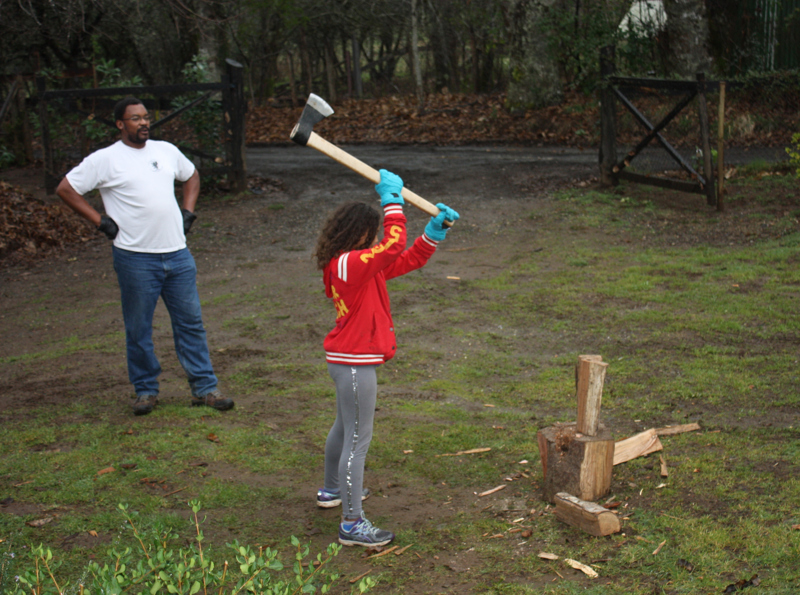
pipe burst, and Don Pato was called, and Leo dutifully stuck by his side to help with the repair.
The way they interacted made us think Don Pato was Leo's abuelo, so a couple weekends ago when Idris got bored he asked if we could call Don Pato to see if Leo could play. As you may know, Geraldo and I are a long way from speaking understandable Spanish. Don Pato, on the other hand, speaks "Chilean," which is also fairly far away from some forms of understandable Spanish. But Idris was up to the task. He dialed and asked very excitedly if Leo was available to play. Don Pato answered and asked some questions in return, to which Idris answered, "Si." Then they hung up. Two minutes later, Don Pato had zipped up to our driveway in his car to find out what was wrong.
"Lo siento, Señor. No hay emergencia. Nos preguntábamos si su nieto Leo podía jugar."
He laughed and motioned for Idris to go follow him.
They walked to a house down the road, and pretty much disappeared. So after a while Geraldo grabbed two beers for sharing and ventured out to see what was up.
About an hour later, he came back and told Io to get her coat on and come with. He and Idris had been with Don Pato at Leo's actual family's house. That family has three kids, and they each had friends over, and ours joined in for a real party. But the show was going on the road because everybody needed to go to the yard of Don Pato's neighbor, Don Cato, to set a trap for the animal that has been eating the ducks in people's yards. (Yep, it's like that.) Adults and kids packed into pickup beds and the front seats of ramshackle cars to take some fish heads down to the river's edge for the trap.
I don't think it's possible to express how much delight this all gave me.
While they set the trap and dug for crawfish, I
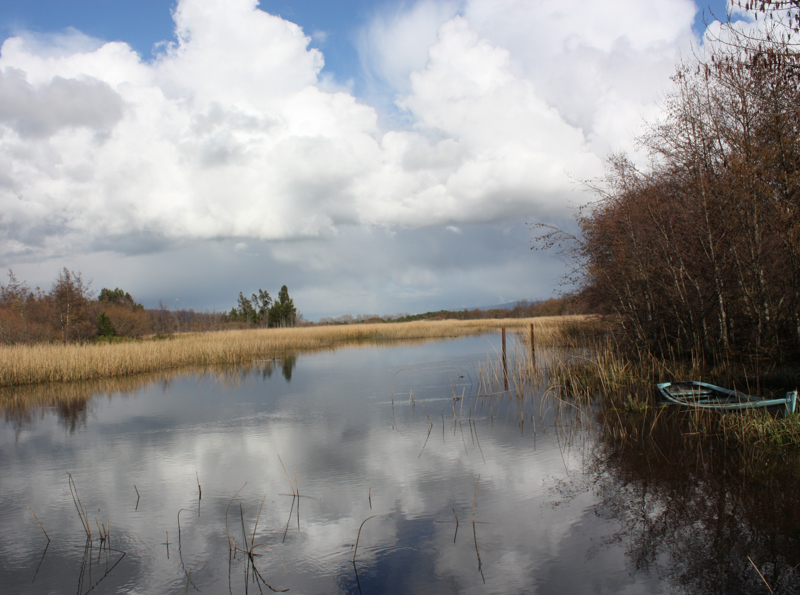
hung back to get dinner ready. And while I was standing by the kitchen window, a woman walked through our front yard waving hello at me. It was another neighbor! She had heard the earlier commotion and just stopped by to say hello and welcome. When it rains, it pours. So I invited her in and we chatted briefly, and I felt like the richest person in the world.
The next day, we wanted to seal the deal with Leo's family so we worked together to make a carrot cake to take over. We found out that Leo's mom grew up on a farm near Munich where she met Leo's dad, who is now a plant geneticist but was then a dairy farm kid from a town about an hour's drive from here. It turns out his last two published papers
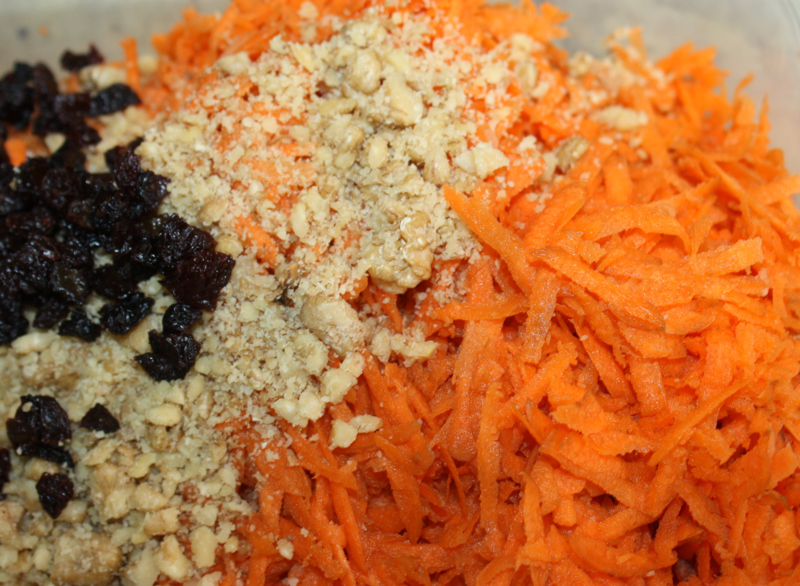
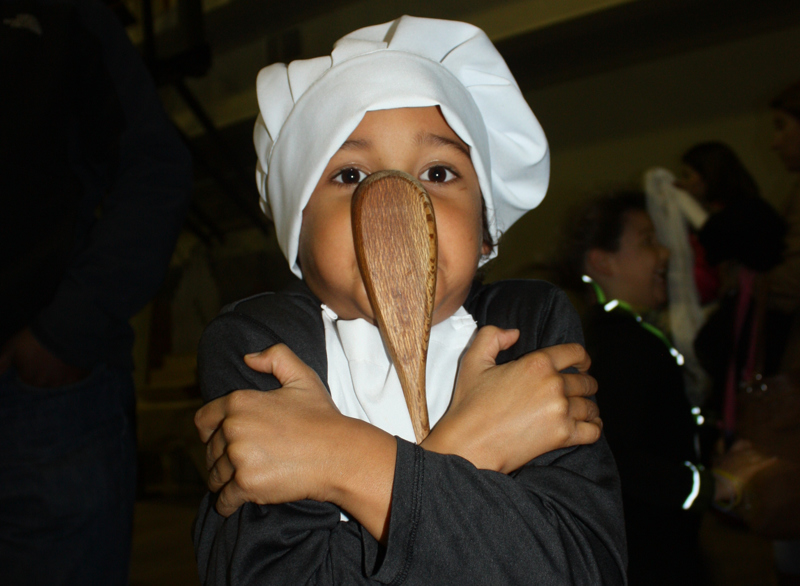
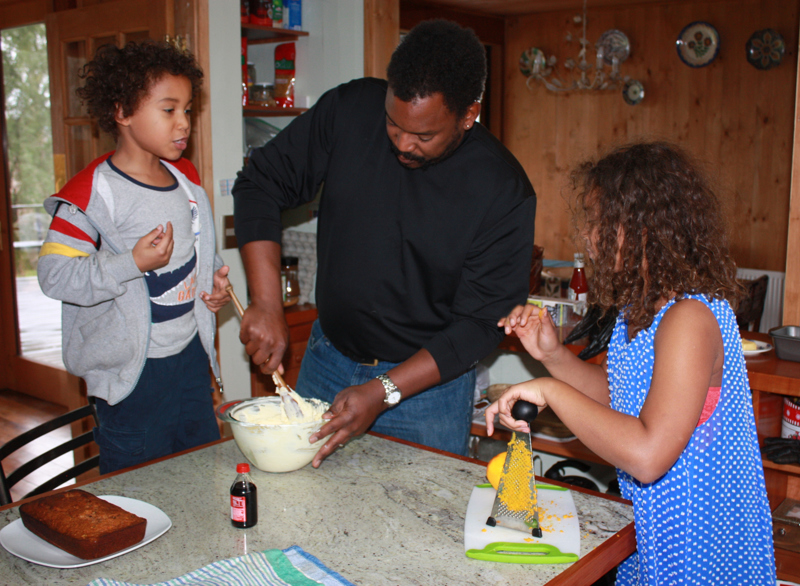

have been on wheat genes. (Anybody in ND remember World Seeds? I think Court alluded to it the other day when she talked about the variety of Courtney wheat my Grandpa Bernie named after her.)
Hanging out with neighbors might be the Number One thing I wanted to do on this trip to Chile. Yes, the adventuring is awesome and my work is going great. But more than all that I wanted to get to know people and find out about this country through their eyes. This day was a dream come true. And I said when it rains, it pours. But
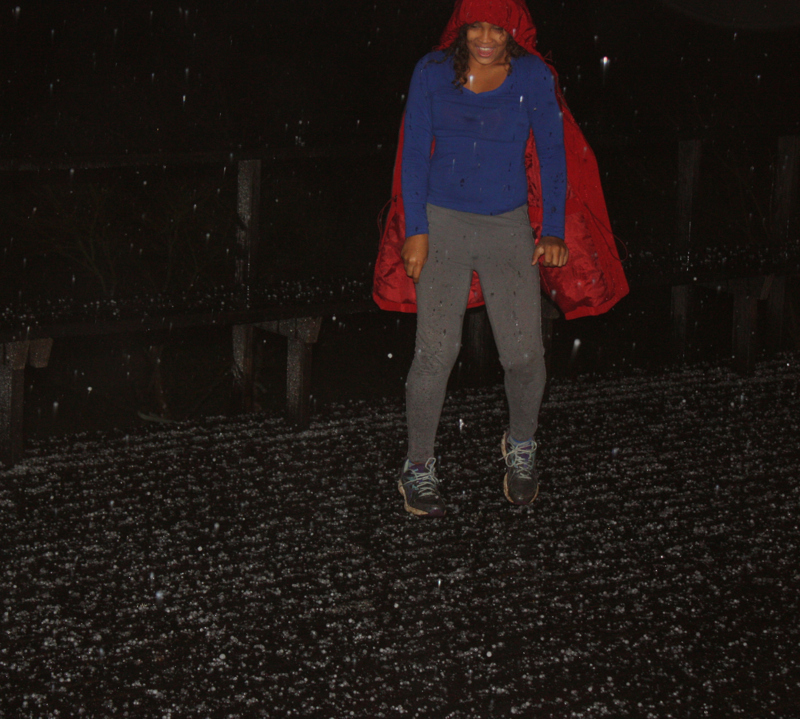
later that week it actually hailed! So let me change the expression to reflect the fun we had with that.
I have two corollaries to this happy neighbor story, if anybody is still with me and wants to pour another cup of coffee. Or wine.
One is funny. We doubled down with the carrot cake and decided to make another one this last weekend. Don Pato and his family have been very kind and helpful, and his daughter even brought us jars of homemade preserves a few days after we moved in. (Again, my Grandma Ann and Popeye aren't far from my mind because it's like I'm eating "sauce" out of their gorgeously built and organized pantry.)
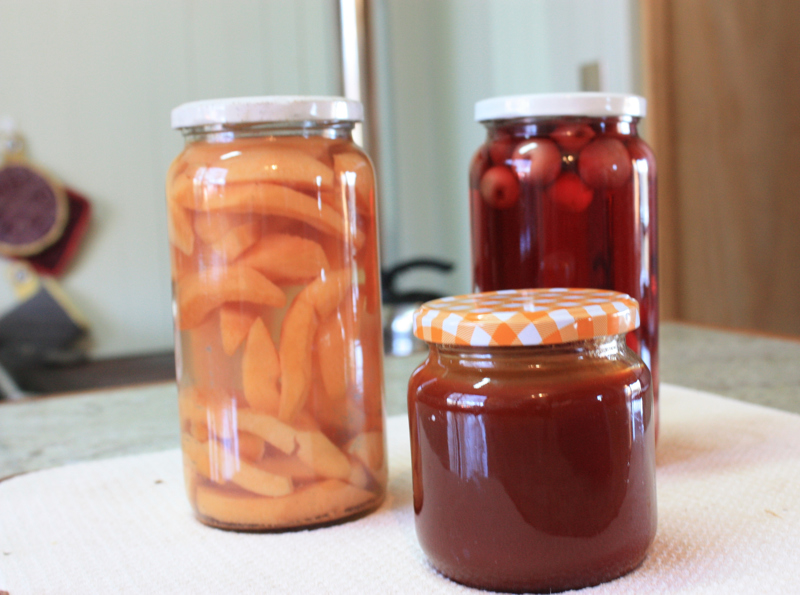
So we sent Io over to their house with the cake and asked her to express our appreciation for all their generosity.
She walked up to their house and saw a woman standing in the doorway. It wasn't Doña Rita or her daughter or anybody else Io recognized, so Io slowed down a little bit and thought about turning back. But the woman saw her and opened the door to greet her. "Hi!" Io said in Spanish. "Um, we're your new neighbors and we just wanted to say hello!" I was really proud of her for finding this suave graciousness in an uncertain situation. She didn't feel like it would have been appropriate to ask if she was at the right house, so she just improvised a greeting and gave up the cake. The woman asked where she bought it. Io told her we made it. She said, "Nobody in Chile makes cake," an allusion to the fact that no one needs to make cake here because there are 100 cake shops on every block. She kept Io out on the front steps and said she'd put the cake on her own plate so Io could bring ours home. And then she said thanks and goodbye, and sent Io on her way! We have no idea who it was, or if Doña Rita and her family actually live there, or if we just gave a cake away to a stranger with no name!
Second, I've been thinking for years about the way people's lives are organized spatially, informed primarily by two influential sources, one event, and a tv show. The two sources are a geographer named Ruth Schwartz Cohen and a student named Julie Garfield. I read Cohen's work in the late 1990s, but she wrote it in the 1970s. It's about the industrialization of the home in the form of household appliances -- you know, those "labor saving" devices meant to free women from drudgery? Her study revealed that these devices did decrease the amount of time women spent on some chores, but, in her words, "new jobs were substituted, and in some cases--notably laundering--time expenditures for old jobs increased because of higher standards." In other words, it was a wash. But you never would have known that from the advertisements that made sure every household would want its own stove, oven, iron, washing machine, fridge, deep freeze, and today: garlic press, immersion blender, dishwasher, waffle maker, microwave, mixer, food processor, blender, and on. Mass production requires mass consumption, and we have done our jobs well.
So I think about the individual kitchen within the
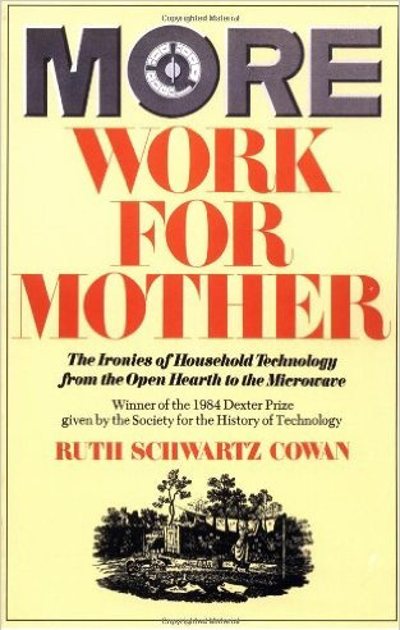
individual household with all its individual tools and appliances, and the belief that this kind of ownership and personal control is part of "what makes this country great."
Then I think about my student Julie Garfield, who (I kid you not) showed up to class one day circa 2002 in Washington DC wearing a thrift shop find: the exact same style ski coat I had worn in North Dakota as a 7th grader (1983). That made me like her, but that's an aside. Garfield told me about the study-abroad trip she had taken to Ghana the year before, and I must apologize for not having the full details of her location together. What I do have is the vivid image she painted in my mind of the way the houses in the area where she lived were arranged. She said it was a semi-rural area, and the houses were clustered into circles. From that description, you might imagine a cul-de-sac -- nothing unusual. But the important difference is that the houses faced out. The inside of each circle was a common area where kids would play and neighbors would gather.
I filed that image away somewhere in mind mind until 2005 when I was a new mother. The event of becoming a parent came with a realization about the importance of space and community. I was alone with Io during the day for most of her first few months, too shy to go out and meet people, too protective to wander very far, too tired to walk down the stairs from our third floor apartment with all the baby junk. Imagine that instead of navigating all of that, all I would have had to do was walk out my back door into the common space I shared with a dozen neighbors. Imagine, too, that we didn't each have refrigerators and stoves in our individual houses, but that there was a common kitchen where we would take turns producing meals for the whole group. I realize frigidaire wouldn't have made much money on this configuration, but I wouldn't have become isolated and lonely, either (which one is more important?). It seems like this could be particularly important at this moment when many people live apart from their extended families without any help. Someone in the back yard could have held my baby for 20 minutes while
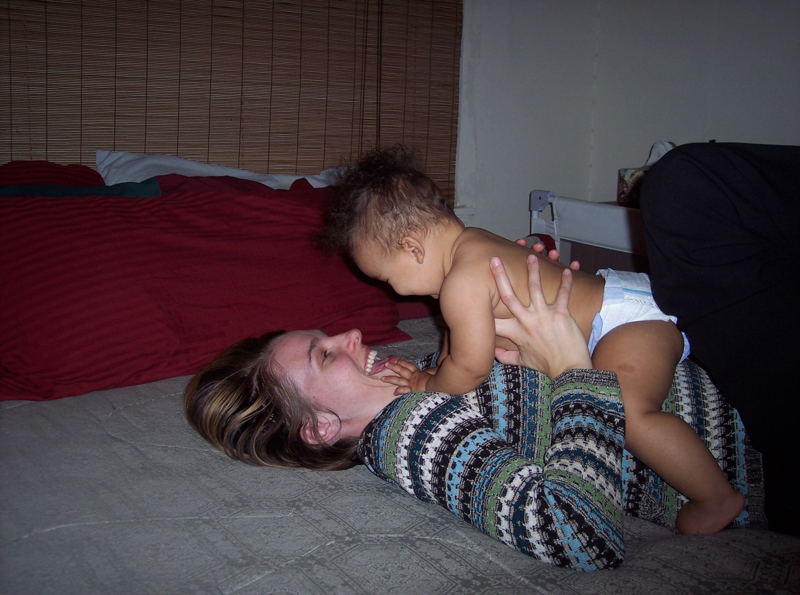
I shut my eyes or brushed my teeth. But why wouldn't people be "at work" instead of chilling out back? Cohen reminds us how much wage-earning work needs to be done to pay for the separate households we try to maintain. All those fridges cost money. So we leave our houses to earn the money to fill the houses with things that reduce our interdependence on each other. Or, we could do something else.
Geraldo had the chance to live in a variation of this arrangement when he was growing up on army posts. The US Army--one of the most socialist organizations imaginable--set up many of its posts with apartment buildings facing out. The inside of each block was the sort of common area in Ghana that Garfield witnessed. Every apartment had its own appliances, so the cooking nirvana I describe wasn't part of it, but at least the kids were able to play freely while the moms checked on them from their back windows.
I found some other moms with this sort of arrangement on a silly tv show from a few years back: Big Love. Did you watch it? It's about polygamists in Utah who leave the compound where they were raised and move to the 'burbs. (Okay, I realize how dumb it is to model my dreams on army posts, patriarchal polygamist compounds, and tv shows, but I'm going to take good material where I can find it.) One guy has three wives and about a zillion kids, and each wife has her own house where her kids live; the guy stays in a different house every night. (I already said I know it's dumb.) What I love is that the houses--you guessed it--have a common back yard. The kids go back there to play and the adults gather there to talk. They all cook in their own individual houses, so they failed to reach the full potential of the arrangement, but I think they do take turns and they do all eat together.
I want homes to be arranged like this. If I could do one thing in my life that's truly worthwhile, it would be figuring out a way to make this sort of arrangement easy, commonplace, and desirable. I know there are city planners, urban ecologists, and oodles of others in many countries who spend their whole careers figuring out what's right and wrong about an arrangement like this. Housing projects, for all their loathsome qualities, incorporated some aspects of this. There are also make-shift versions of this all over the place, such as in one of the community garden spaces in SE DC where people in the surrounding houses raise their kids largely outside and meal share so that
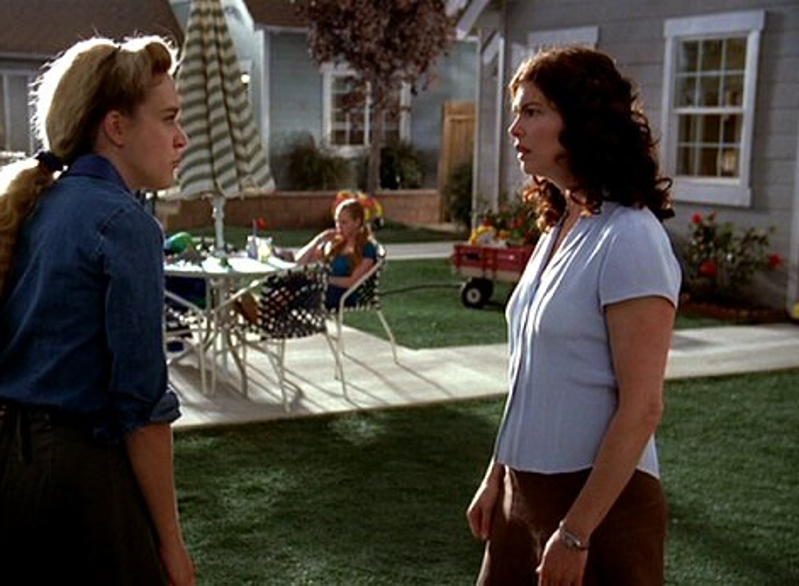
nobody cooks dinner more than twice a week.
I also know that people like having autonomy and privacy and they don't want gross people making gross food for them. I think I spent most of my life feeling this way too. But I've changed my mind. Community is everything. Connecting with each other (even outside of cyberspace!) has intrinsic meaning and worth. I was moved recently reading a short piece by John McKnight and Peter Block called "The Hidden Treasures in Your Neighborhood." They call out our individualistic, consumer society as dysfunctional and urge us to re-prioritize raising our children in a way that makes them whole, rooted, contributing members of our communities. This, of course, requires knowing
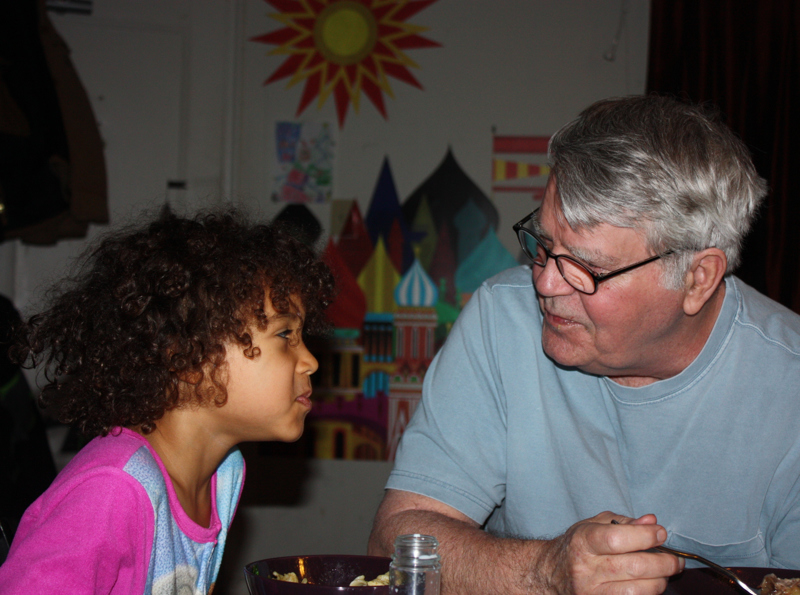
the members of our communities. I am grateful because I think my dad has got to be the greatest example of this. He stops and talks to everyone. He chats with you to find out what makes you tick. He listens and ends up knowing where everybody is from, who they're related to, and what funny things their kids have done. In McKnight and Block's vision, Dad would get linked up with a kid in the neighborhood and teach her how to collect oral histories. Another kid would spend Thursdays after school working with a neighbor on plumbing rather than going to private violin lessons. All the needs and all the skills of the community members would be compiled and assessed, and matches made.
I'm thinking about all this while I'm here in Chile because while we had a lovely weekend of neighborliness a couple weeks ago, we have not seen those neighbors since. Our back yard is enormous, but it's blocked off on all sides. So is theirs. So is the next neighbor's. If the kids want to get together, you have to call or text or knock on the door or some other thing. Mr. Six-Year-Old Social doesn't mind any of this, of course. But his mom, Ms. I Don't Want To Bother You, And If You Wanted Your Kids To Come Over You Probably Would Have Already Asked, So I'm Going To Keep My Kid Home To Make Sure I'm Not Crossing Any Invisible Lines of Propriety isn't very good at those sorts of things.
Of course there are other solutions, parks, libraries, and public schools being some of the best examples. And we've lived our lives at the gorgeous and less gorgeous parks, libraries, and schools of Washington DC. But what was "sending your kids to the park" in my mom's day is called "free range parenting" today, and is punishable by law. So we go. And we sit. And we talk to neighbors for a few minutes. And then we go home to our individual kitchens to make our individual dinners.
I'm realizing I must be the most anti-social socialist in history. Nonetheless, I've got space on my mind and community in my heart. I want to teach my kids that contributing to their communities may be the most important thing they can do with their lives, and I don't want to have to jump in the car or thumb my device to facilitate that. So before my dream communities revolutionize the world we'll keep making cakes, keep bringing them over to neighbors, and keep trying to make it rain.
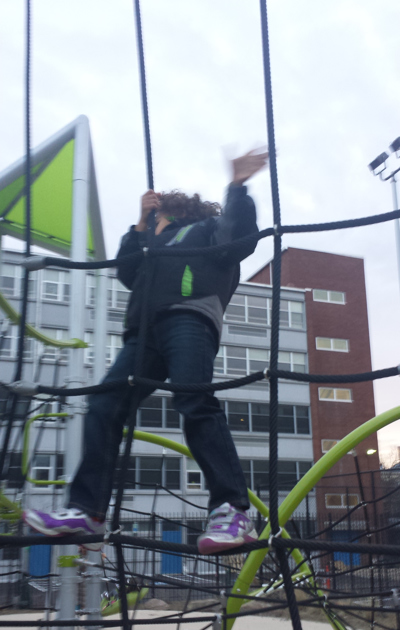
1.
At the Consulate in DC
2.
Bus Reservations Stress Me Out
3.
Small
4.
Getting What You Asked For
5.
First Days in Valdivia
6.
Ridiculous Goodness
7.
FOOD. primeras observaciones
8.
Temas Fotográficos de Idris: colillas
9.
Our Bearings: they have been found and embraced
10.
A Dad Who Listens
11.
Two words for you: aguas calientes
12.
Temas Fotográficos de Idris: hongos
13.
Time for Poetry
14.
Hiking Parque Oncol
15.
Green Eggs sin ham
16.
When it Rains it Hails
17.
Generosity
18.
The Unique Foods of Southern Chile
19.
Pucón
20.
La Playa
21.
Bonus Book Review
22.
Chile Wrap Up